Keep a Proper Balance, Seventy Tells BYU–Hawaii Graduates
Contributed By Marianne Holman Prescott, Church News staff writer
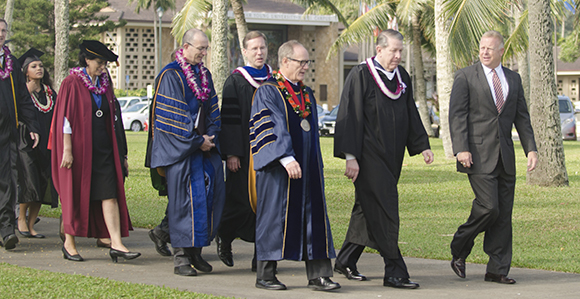
Elder Donald L. Hallstrom and BYU–Hawaii President John S. Tanner lead the processional prior to commencement exercises on February 27.
Article Highlights
- Giving adequate time and effort to the things that really matter is vital to success.
- Essentials include love for Heavenly Father and Jesus Christ, care for family, service to the Lord, and temporal work.
- If a person is out of balance, he or she can change.
“Seeking balance among the essential responsibilities of life is preparatory to salvation.” —Elder Donald L. Hallstrom of the Presidency of the Seventy
LAIE, HAWAII
“Seeking balance among the essential responsibilities of life is preparatory to salvation,” Elder Donald L. Hallstrom of the Presidency of the Seventy told graduates of Brigham Young University–Hawaii during commencement exercises on February 27.
The event, held in the Cannon Activities Center on the Laie, Hawaii, campus, honored graduates—216 bachelor's degrees and 52 associates degrees—from more than 24 countries around the world.
In an effort to be brief, practical, and clear, Hawaii native Elder Hallstrom shared a simple message about finding the proper balance between the demands of family, work, and Church as graduates move to the next phase in life.
Using the example of a performance he watched on television as a child, Elder Hallstrom told of a man who was able to spin plates—and keep them spinning for a time—on a handful of long poles.
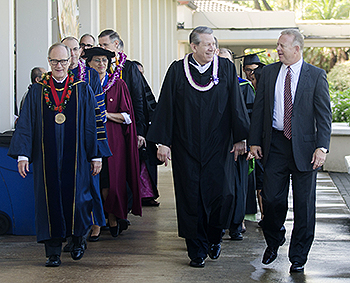
Elder Donald L. Hallstrom and BYU–Hawaii President John S. Tanner lead the processional prior to commencement exercises on February 27. Photo by Monique Saenz.
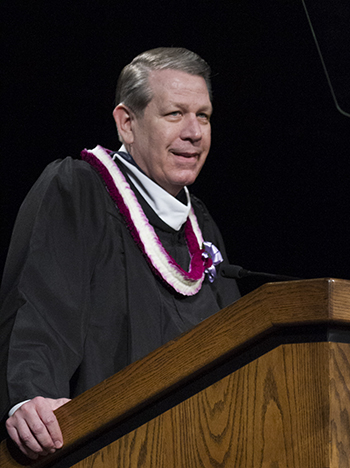
Elder Donald L. Hallstrom of the Presidency of the Seventy speaks during graduation at BYU–Hawaii on February 27. Photo by Monique Saenz.
“As he proceeded down the line of poles, the rotation of the plates on the first and second poles would begin to slow and the dishes were in danger of falling off and crashing on the floor,” Elder Hallstrom explained. “Seeing this, the man would quickly run back to those poles and with a gentle spin increase the motion that allowed the plates to keep spinning. The excitement of the act was to witness the ability of the performer to expand the number of rotating plates while not letting any fall.”
Despite the performer’s best efforts, eventually there came a point where he was not able to keep up. There was a limit to his ability to increase the number and properly care for the plates already in motion.
“The sight of dishes sliding from their precarious perches and the cacophony as they hit the hard floor vividly proved the point that even the most skilled performer has limits,” Elder Hallstrom said.
Just as the performer met a pace too quick to sustain, Elder Hallstrom warned graduates of keeping a proper balance in their lives.
“Of much greater consequence, each of us must decide how many ‘poles’ we are able to manage in our life and what they represent,” he said. “Some individuals are spinning a single plate, with all their effort, ignoring all other poles. Others are attempting to spin so many at the same time that the crashing of ‘plates’ is often heard.”
Leading a balanced life is difficult and changes during different phases of life. Seeking balance—giving adequate time and effort to the things that really matter—is vital to success, Elder Hallstrom taught. “There are certain fundamental responsibilities we cannot neglect without serious consequence.”
Elder Hallstrom shared four “essential poles” of life: love for Heavenly Father and Jesus Christ, care for family, service to the Lord, and temporal work.
Love for Heavenly Father and Jesus Christ
“Every other aspect of our life is enhanced when we truly love our Heavenly Father and Jesus Christ, as we will love ourselves and others more completely,” he said. “Answers to our most challenging problems are found only when we love and have faith in Them.”
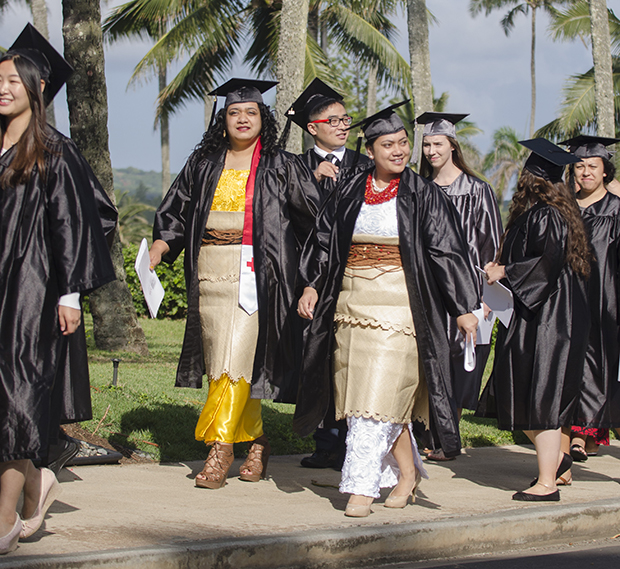
Graduates walk in the processional prior to BYU–Hawaii graduation on February 27. Photo by Monique Saenz.
Care for family
Drawing from “The Family: A Proclamation to the World,” Elder Hallstrom spoke of the solemn responsibility to love and care for family.
“For many, properly caring for our family is the first area of compromise when other demands arise, as the results of neglect are not always immediately apparent,” he said. “Nurturing the husband/wife relationship and building a spiritual home requires men and women of vision and commitment.”
Service to the Lord
A natural extension of love for the Savior is the desire to serve Him, Elder Hallstrom taught.
“Our time spent in Church and community service may vary during different periods of our life depending on specific callings we may receive and our family circumstances,” he said. “However, our desire and our availability to serve should never waver.”
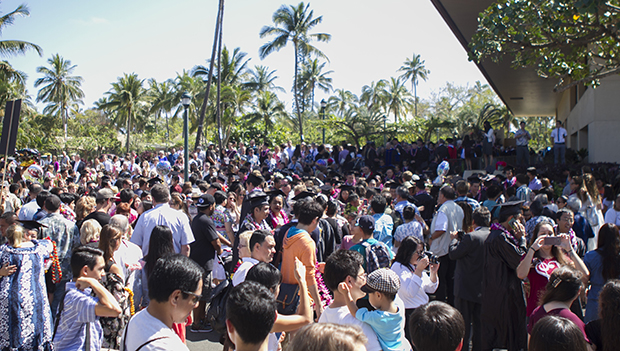
Graduates and their supporters gather on the BYU–Hawaii campus after commencement exercises on February 27. Photo by Monique Saenz.
Temporal work
“Although temporal work is temporary, it is still important as a support to the other, more long-lasting aspects of life and provides valuable service to others,” he said.
Elder Hallstrom spoke of the importance of obtaining a quality education, which allows choices in one’s life work and dedication to a trade or profession that will serve one’s spiritual life.
“These four ‘poles’ must not be neglected,” he said. “Each needs constant care to fulfill its proper role in making us ‘whole’ (see Mark 2:17).”
All sincere followers of Christ must constantly evaluate what is most important.
“How do we know if our life is out of balance?” the leader asked. “Well, most of us just know. We simply need to admit it and exercise the discipline to change, substituting higher values and better habits for those we have been living. We need to follow the counsel of President Spencer W. Kimball to ‘do it now’ before any further damage is caused by our lack of attention to other indispensable parts of life. For others, recognition of imbalance may not be so clear.”
Elder Hallstrom encouraged graduates to be aware of their priorities and to do their best each day.
“We organize, prioritize, and live worthy of spiritual guidance required when making the difficult decisions,” he said. “Often, we seek counsel from those closest to us. From time to time, we may be ‘out of balance’ for a brief period as the immediate needs of one portion of our life take temporary precedence. When this occurs, we knowingly work through the issue and seek to stabilize ourselves as soon as possible, before the short-term need becomes a long-term trait.”
Elder Hallstrom noted that if a person is out of balance, he or she can change.
“We can delay and be compelled by the tragedy of a failing family or the sorrow of losing our own spirituality, or we can be attentive and continually nudged by the whisperings of the Holy Spirit. Seeking balance among the essential responsibilities of life is preparatory to salvation. …
“For all of us, continual focus is required because we live in a world that can confuse us and societal priorities of material wealth, pleasure, or prestige can overwhelm the simple but profound personal characteristics that each of us must seek.”
Other speakers included BYU–Hawaii President John S. Tanner; Mark B. Woodruff, assistant to the Commissioner of Education in the Church Educational System; and graduate Aditya Mongan.

Elder Donald L. Hallstrom and BYU–Hawaii President John S. Tanner lead the processional prior to commencement exercises on February 27. Photo by Monique Saenz.
